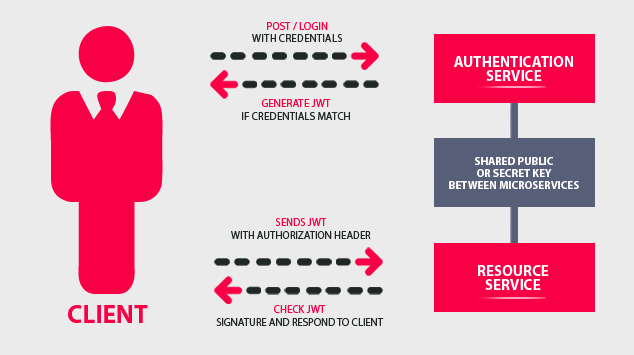This section displays the claims that will be signed and base64-encoded into a complete JSON Web Token. Signed JSON Web Token Key. Generate 32-byte key; Generate 64-byte key; Generate 128-byte key; Base64-encode the token Copy JWT to Clipboard. We create a TokenHandler which is a.NET Core inbuilt class for handling JWT Tokens, we pass it our token as well as our “expected” issuer, audience and our security key and call validate. This validates that the issuer and audience are what we expect, and that the token is signed with the correct key. I believe the libraries I'm attempting to use in dotnet core are trying to load a cert as an X509 then get the RSA Private key to send into a jwt.Encode method. I am not able to just use the pem file.
- Generate Jwt Token With Private Key
- Generate Jwt Token With Secret Key
- Generate Jwt Token With Public Key
- Generate Jwt Token With Private Key Online

I challenged myself during last weeks to implement an authentication on a freshly created API. After digging around, I found that one of the best solution would be JSON Web Tokens. As understanding a concept passes by experimenting it, here is a post describing how to forge such a token in JavaScript.
Within the App Credentials page of your JWT app, you will see an option to View JWT Token. Here you can quickly generate a temporary token using the current API Key and Secret for the given expiration time. This single temporary token can then be used to test Zoom APIs, but should never be used in production applications. JSON Web Token (JWT) is a compact URL-safe means of representing claims to be transferred between two parties. The claims in a JWT are encoded as a JSON object that is digitally signed using JSON Web Signature (JWS).
What is JSON Web Token (JWT)?
JSON Web Token (JWT) is an easy way to secure an API. When a user authenticates first on a server, using for instance a standard login form, the server creates a token. This token includes some personal data, such as username or email address. Then, this token is signed server-side (to prevent token integrity), and sent back to the user. Within each next request, user sends the token to establish emitter identity.

JSON Web Token is composed of three main parts:
- Header: normalized structure specifying how token is signed (generally using HMAC SHA-256 algorithm)
- Free set of claims embedding whatever you want: username, email, roles, expiration date, etc.
- Signature ensuring data integrity
Creating a JSON Web Token in JavaScript
JSON Web Tokens may be resumed by the following equations:
Base64 URL encoding
Note I wrote base64url, not base64. There is indeed two small differences between these two encodings:
- There is no
=padding at the end, +and/characters are replaced by-and_respectively.
Implementing such a function can be achieved in JavaScript:
I use CryptoJS library to achieve the standard base64 encoding. This is a useful library whenever you want to assume some cryptographic, hashing or encoding tasks. This is perfectly the case, with the incoming HMAC signature.
To make this function work, you have to specify source as an array of UTF-8 bytes. It can easily be achieved using another utility function of CryptoJS: Utf8.parse.
This extra call is not included into the base64url function for signature commodity. But you are going to notice it later.

Creating our unsigned token
We can now encode our header and claims. Header is normalized, and contains two alg and typ fields indicating the used signature algorithm.
Generate Jwt Token With Private Key
After executing this first snippet, we got our unsigned token:
Signing our token
Generate Jwt Token With Secret Key
Finally, to ensure our token integrity, we should sign it with a secret. Signature is the HMAC SHA-256 (as specified in header) of our current token. And as usual, we should base64url encode it.
No need of Utf8.parse the output of HmacSHA256. It is indeed already an array of UTF-8 characters. That’s why I didn’t include this method in our base64url function.
Of course, you shouldn’t share your secret client-side. Tokens should be forged server-side. Otherwise, everyone would be able to modify your tokens and pass them as genuine.
If you execute this code, your signed token should look like:
Generate Jwt Token With Public Key
There is plenty of libraries dealing with JWT. Creating tokens by hand is only a good idea to learn how they work. On a real project, don’t reinvent the wheel and use existing third-part tools, such as LexikJWTAuthenticationBundle for Symfony2 users or node-jsonwebtoken for Node.js developers.
The full code of this post is available as a CodePen.
Generate Jwt Token With Private Key Online
Another interesting resource: JWT.io